“Polish specialty”. PCPM develops more emergency services in Africa
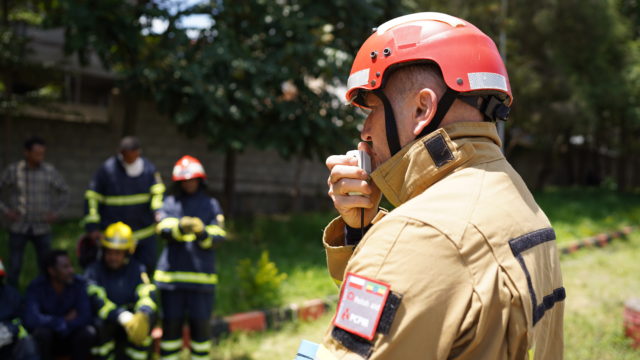

PCPM has become a brand that represents Poland in East Africa – says Wojtek Wilk, CEO of the Polish Center for International Aid (PCPM). The foundation is training emergency services in another East African country. Over a hundred people have completed demanding training in Ethiopia.
Addis Ababa officially has over 3.7 million inhabitants. However, the actual number is impossible to determine. Over 120 million people live in the whole of Ethiopia, and the number of citizens increases every year. According to cautious demographic forecasts, Ethiopia is expected to exceed 200 million citizens around 2050.
– This is a huge challenge in every aspect. Equally for health care, safety, and employment. In Ethiopia, every year 3 million people join the labour market, which makes it impossible for all of these people to find work – says Dr. Abdi Jibril Ali from the Ethiopian Human Rights Commission.
Unfortunately, the number of services, including firefighters, is insufficient. In Warsaw, which has a population of 1.7 million, there are about 1,800 firefighters (in 17 fire departments). In Addis Ababa only 1,200 while there live officially 2 million more people than in Warsaw, but in fact many more.
– There is a shortage of fire departments, we currently have 11 of them, and we need at least 20. The same applies to staff. There are 1,200 firefighters in Addis Ababa, but we need at least 3,000 – says Tilahun Tola, deputy commissioner of the Fire and Disaster Risk Management Commission, the unit responsible for coordinating the activities of the services in Addis Ababa.
Polish experiences
The Polish Center for International Aid Foundation has been developing the firefighting system in Kenya for years and now, based on its experience, it also wants to help the services in Ethiopia. The equipment of the fire brigades exceeds what the Kenyan fire brigade had to deal with 12 years ago. However, it is still far from the standards known in Poland. Especially as PCPM starts to equip the units in the country’s capital and in other regions of Ethiopia the situation is much worse.
– The biggest problem is definitely the lack of training. Although this does not mean that they do not need additional equipment. PCPM has already given some of the equipment that we used during training to the Ethiopian fire brigade. Unfortunately, in many units in the country, the situation is much worse – says Janusz, a firefighter, an instructor from Poland.
No equipment can replace skills
– The biggest problem is that the equipment, even if available, is useless if someone does not know how to use it – adds the Polish instructor.
– That is why we focus so much on training – says project coordinator Adam Kukliński from PCPM.
However, as he emphasizes, one of the most important tools that the foundation has already provided are thermal imaging cameras, which will be the first equipment of this type in the whole of Ethiopia.
– Such cameras are commonly used in Poland. In Ethiopia, they are a novelty. Thanks to them, when the entire building is filled with smoke or a room is on fire, you can locate the source of the fire or find a person – explains Janusz, the Polish firefighter.
PCPM would like to be able to reach with the trainings every firefighter in Addis Ababa and in the future also other units located in the south of Ethiopia. An important point in education is to improve the quality of the training center in Addis Ababa. That is why PCPM brought representatives from the Ethiopian Fire and Disaster Risk Management Commission to the city of Kiambu in Kenya. That is the place where the Foundation has been developing the fire brigade for 10 years and created a training ground from scratch.
Kenyans and Ethiopians exchanged experiences under the supervision of Polish instructors.
PCPM showed a special fire truck – a model that was assemblied by the PCPM using a local truck as a base. That kind of fire truck is much cheaper than the ones bought and delivered from Europe.
The Ethiopians had also an opportunity to see the proces of creating the first Urban Search and Rescue Team in this part of Africa. USAR is used to to search for living people under rubble.
Cooperation
According to Polish and Kenyan instructors, the biggest problem of Ethiopian services, apart from the lack of skills, is the lack of coordination. In Ethiopia, the emergency medical service system operates on completely different principles than we know in Poland.
Ambulances that are owned by hostpitals are mainly used to transport patients between hospitals. Other ambulances and fire brigade medics are responsible for transporting patients from accidents. Unfortunately, there are no procedures on how these two units should cooperate. An additional difficulty is the specificity of Addis Ababa’s topography. This city is very congested and even driving with the so-called siren on does not guarantee that you can move quickly around the city. Therefore, both medics and ambulance drivers bear a great responsibility, because during the entire time of transporting a patient, they are responsible for his life.
– In Ethiopia, firefighters are perceived mainly through the prism of fighting fires, and this is a mistake. After all, the emergency services help during accidents, floods, earthquakes, collapses, etc. – says Zerihun Lemma, president of the International Institution of Rural Reconstruction, a local organization cooperating with PCPM.
The Polish Center for International Aid (PCPM), provides training not only to firefighters, but also to medics from the fire department and to ambulance drivers. However, most importantly, PCPM teaches them how to cooperate with each other. Therefore, after conducting training sessions at the firefighter training center, joint maneuvers were held.
PCPM takes a holistic approach to increasing the efficiency of services. In addition to training and additional equipment, PCPM cares about the coordination of various organizations and institutions. Only through cooperation on many levels it will be possible to increase the quality of services.
– The equipment provided by PCPM allows for conducting training, but the Ethiopians lack practice – says Janusz Majtyka, a Polish firefighter and instructor in Ethiopia. – That is why during these 2-week trainings I focused on the basics and practice. If the firefighters have these skills, then they will be able to cope with everything – he sums up. According to Janusz, who was the head of the fire brigade unit for years, the progress is very significant for two weeks of training.

– During the maneuvers, the most important thing I noticed was how the firefighter leader gives orders and manages the situation and confers with the medic leader – he says.
PCPM organized two simulations. The first was an accident and a bus fire, where participants had to conduct a triage of the injured, decide who to help first, and above all organize help for many people at the same time.
The second simulation was a fire in a theater, where rescuers had to work in a smoke-filled room.
– We know that our firefighters often have only basic skills, which is why constant cooperation with PCPM is so important. One training is not enough, so constant training and a system are needed – says Lemma. Therefore, according to the project coordinator, PCPM’s response to these needs is to select the best firefighters and create a staff of instructors.
Medicine
A specific feature of many countries in East Africa is the lack of a systemic approach to medicine. Hospitals, even those that are well-equipped and have good staff, are often unable to help because a patient has waited too long for an ambulance to arrive or has been treated badly on the spot of accident or during the way to the hospital. Emergency services are inexperienced and the level of cooperation with hospitals is very low.
– We have to go back to basics – says Marcin, a firefighter and instructor from Poland. – As a rescuer, you have to constantly educate yourself and refresh your knowledge. Two weeks of training can only show a small piece of your knowledge, which is why it is good that the PCPM project is spread out over time. It has to be systematic work – he continues.
According to Marcin, each group consisted of at least a dozen or so people who had the potential to become instructors. However, the ambulance drivers made the greatest impression.
– It is very encouraging. These people are de facto involved in transport, and our goal was to create a basic knowledge base for them, so that they could, for example, support a medic or a doctor in an ambulance. However, their commitment completely exceeded my expectations. The people who attended our courses were very hungry for knowledge – Marcin sums up.
The PCPM Foundation has delivered training equipment to the training center at Alert Hospital in Addis Ababa in previous years. In the ongoing project, the equipment is also being delivered, although in smaller quantities, as PCPM will equip ambulances which – together with training – will significantly increase the efficiency of the medics’ work. That will directly translate into the health of patients.
In 2024, a total of 18 firefighters who are candidates for instructors and 106 medics and ambulance drivers were trained.
Real cases
During the training sessions, instructors from Kenya also came to Ethiopia. Alex, Richard, Patrick and Benson are experienced firefighters who have been working with PCPM for years. They started as regular firefighters. Thanks to the PCPM Foundation, they have significantly developed their skills and now they can share their knowledge with colleagues from Ethiopia.
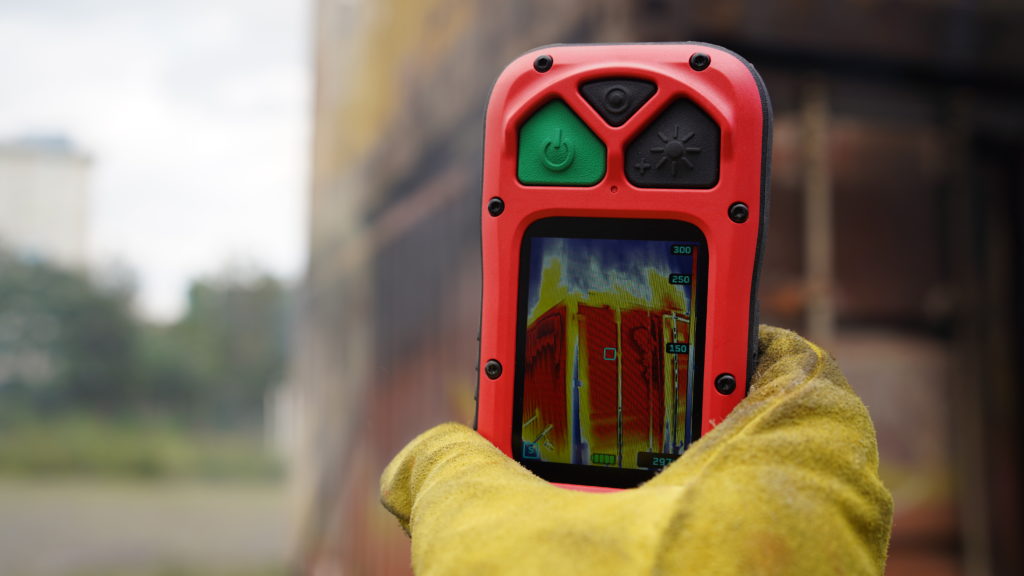
– For me as a firefighter and instructor, this is a great opportunity, but also a distinction – says Alex. Together with Janusz, for two weeks, they trained a team of future firefighter instructors in Ethiopia. – Ethiopia is struggling with similar challenges in Kenya, which is why it is easier for us to talk about some things. On the other hand, we are also an example of how systematic work can lead to success – sums up Alex.
Polish brand
– PCPM has become a brand that “advertises” Poland in East Africa. Of course, the most important thing for us is a well-done task, but we are glad that thanks to our systematic work, Poland and of course our organization is associated with development projects of the rescue service – says Dr. Wojtek Wilk, CEO of the Polish Center for International Aid (PCPM) Foundation. – Poland does not have as much money as Germany, the USA or France, which is why in cooperation with the Polish Aid program of the Polish Ministry of Foreign Affairs, we direct our projects to the development of services – adds dr. Wilk.
PCPM does not focus only on Addis Ababa. In 2025, the foundation will begin training in two southern regions of the country: Sidama and Southern Ethiopia. Following the education, fire brigades will receive new equipment. What they currently have, for the most part, falls short of the standards of effective firefighting or helping the injured.
The Polish Center for International Aid works in Tanzania, Ethiopia and Kenya. The latter country in particular is an example of the huge success of Polish aid programs. After 12 years, thanks to PCPM, both the number of firefighters and fire brigades in Kenya has tripled, but most importantly, a training system that has been created was approved by the Technical and Vocational Education and Training Authority. This means that The Kenya National Qualifications Authority (KNQA), an official administrative unit in Kenya, issued professional diplomas.
In Tanzania, PCPM has trained hundreds of medics and emergency services. In the last stage of the project, medics from the PCPM Emergency Medical Team counducted treatments in Tanzanian hospitals. This allowed them to share their knowledge with Tanzanian medics using real cases.
Ethiopia is another country where PCPM wants to significantly improve the quality of public services and increase their capabilities.
– Aside from the obvious role of saving lives, competent emergency services also increase safety. Foreign businesses are more willing to invest in a country that is safe and the emergency services operate efficiently. New jobs also mean economic improvement for local residents, and this is something the continent needs very much – says Wojtek Wilk.
All projects in Ethiopia, Kenya and Tanzania have been financed for years under the Polish Aid development aid program of the Ministry of Foreign Affairs of the Republic of Poland.
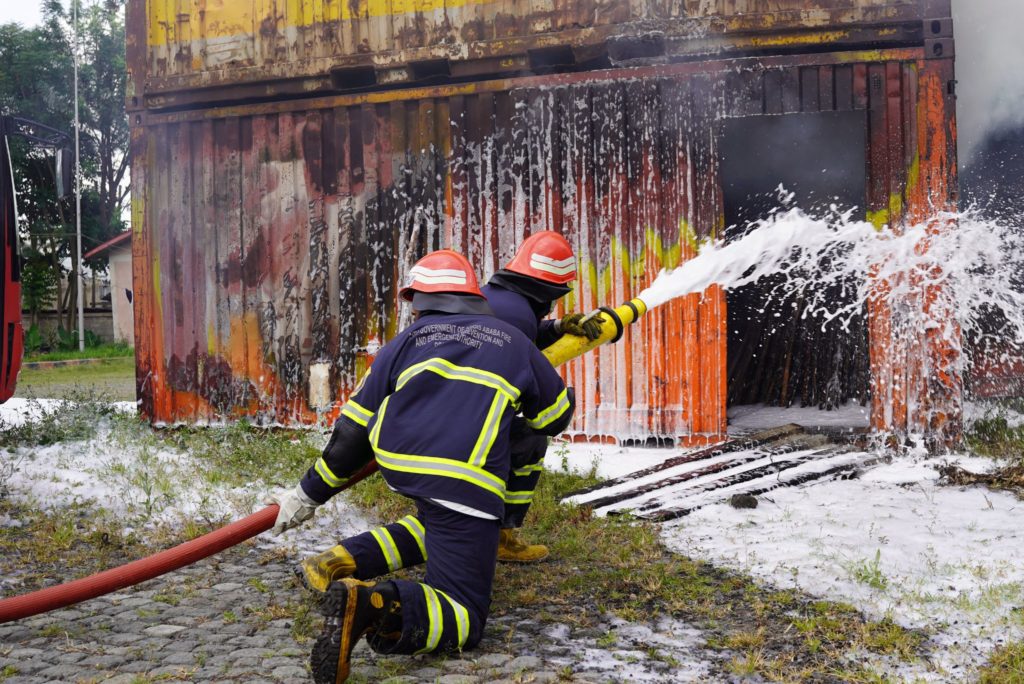
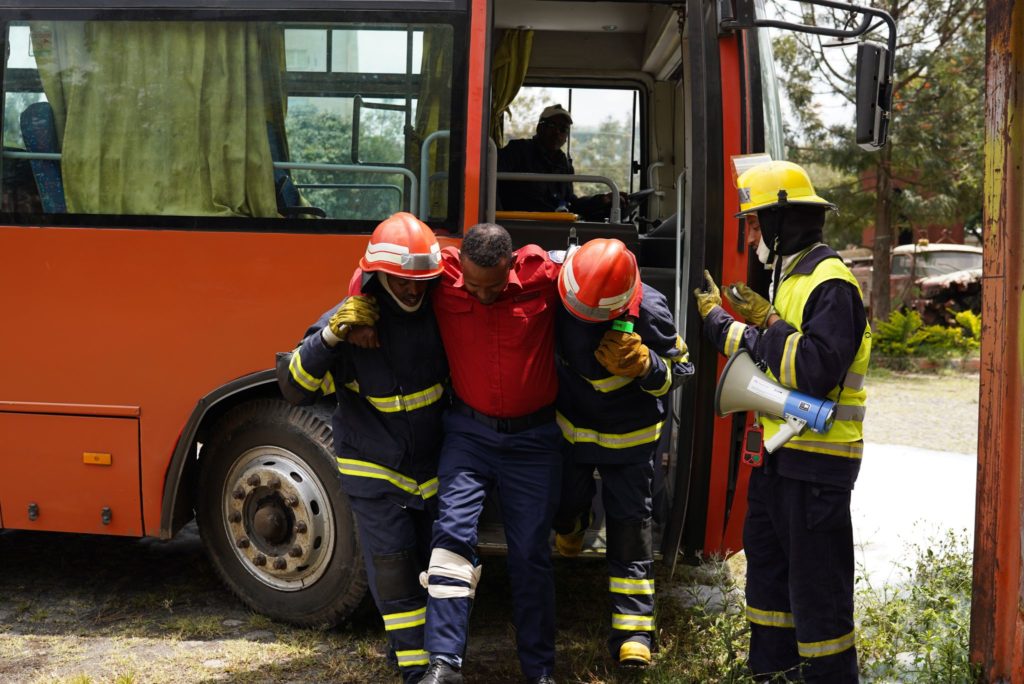
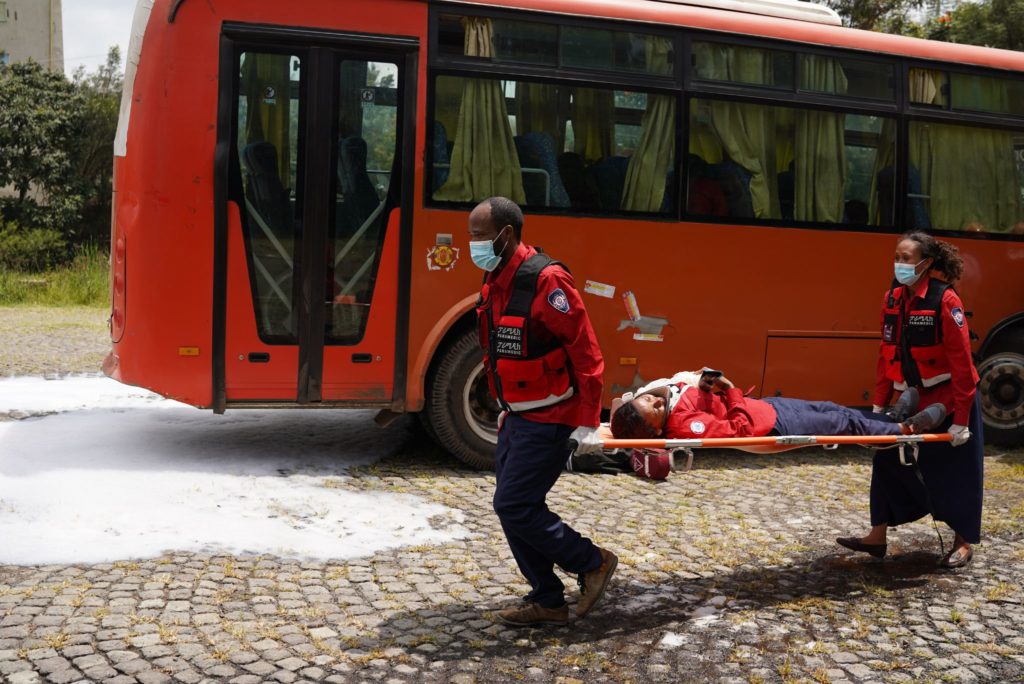
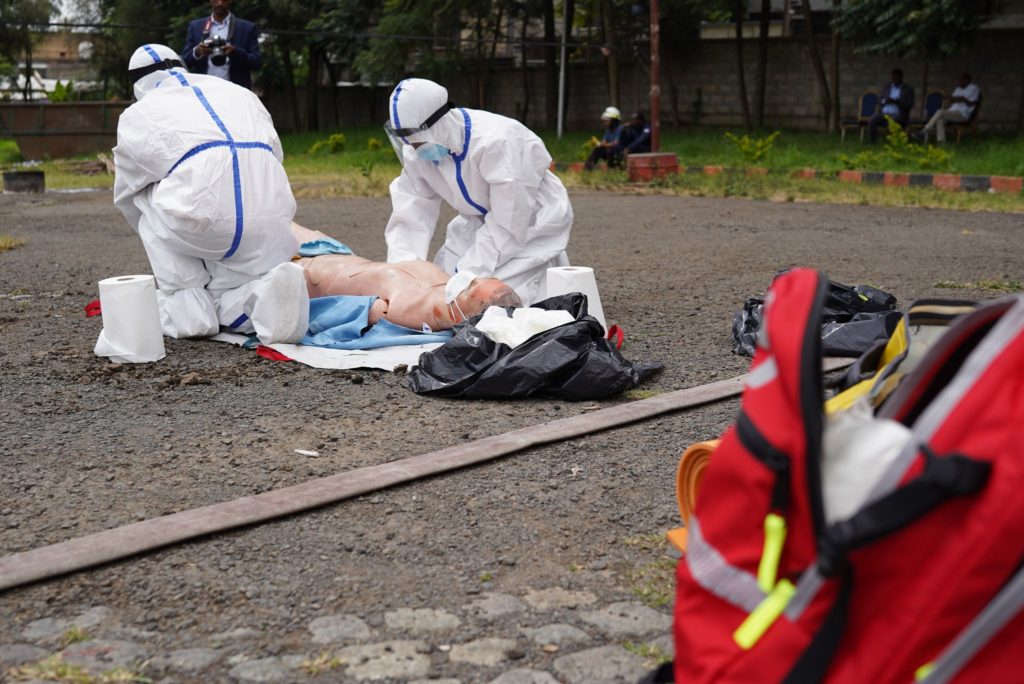
The Project – called „Support for the development of rescue services and crisis response services in Ethiopia 2024-2026″ – is co-financed by the state budget as part of the Polish development cooperation of the Ministry of Foreign Affairs of the Republic of Poland.
The value of the Module 1 funding is PLN 1,599,679. The total value of the task is PLN 6,396,073. The implementation of the project includes: conducting training and purchasing equipment for the fire brigade, ambulance crews and veterinary services in Ethiopia.
